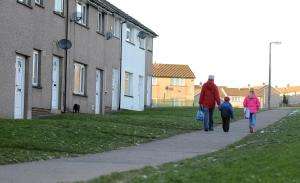We must tell the stories of poverty to shock people into action

Published by Professional Social Work magazine - 4 March, 2021
Telling the real life stories of poverty is the best way to create a “groundswell” of public outrage that can force policy change, social workers were told.
The message came from a webinar hosted by BASW Northern Ireland as part of the association’s World Social Work Month celebration a day after chancellor Rishi Sunak's budget was criticised for not doing enough to address inequality.
Speakers at the event, titled Poverty is a political choice: a social justice response to addressing economic Deprivation, warned the pandemic had forced more people into hardship.
Homelessness activist Father Peter McVerry said: “The way forward is we need a groundswell of opinion that pushes government to make changes. That groundswell has to include middle-class people and the way you get middle-class people on board is to tell stories.
“You can give statistics until the cows come home but it doesn’t move people, it is the stories that move people, the stories of people struggling, in difficulty - that’s what moves people.
“We need to get those stories out there and get that groundswell of public opinion that demands change.”
Fr McVerry is founder of the Arrupe Society which changed its name to the Peter McVerry Trust and is now one of the Republic of Ireland’s leading homeless charities.
He blames the housing crisis in the Republic and poverty on government policies that have pursued a "neoliberal" agenda where a few profiteered of the majority.
“The Republic of Ireland has nine billionaires," he said. "Last year they saw their wealth increase by 3.84 billion euros, some of it pushed into off-shore accounts. If we want to understand poverty we have to analyse wealth.
“If we were to fairly tax those who could afford to be taxed we would have no poverty in this country, we would have no poverty in the world.
“Millions have suffered loss of job and income and been pushed into poverty while the world’s billionaires have increased their wealth at an enormous rate during the pandemic.”
Fr McVerry said poverty has become “normalised” as an unavoidable part of society.
“We need to get rid of that narrative and ensure poverty is understood as a failure of government policy. We can eradicate it if we put our mind to it.”
The normalisation of poverty and homelessness meant people were no longer shocked when confronted by statistics, said Fr McVerry.
“We need to shock them. And the way to shock them is to tell the stories of people who are suffering in poverty.”
Fellow speaker Dr Ciara Fitzpatrick, a social security researcher at Ulster University in Northern Ireland, said social workers had an important role to play in highlighting the impact of poverty on people.
“Poverty is a huge problem here and we need to constantly bring attention to it. We need to hold our elective representatives to account and ask what they are doing and what they plan to do to take a structural and sustainable response to poverty.
“If you see something in your practice that is bothering you and it is the direct impact of poverty I would encourage you to get in touch with your local councillor and say 'this is a real problem in your community at the moment and we need to see action on this'.
“The more voices our elected representatives hear, the more forceful our message can be.
I think they don’t fully understand the extent of the problem because they aren’t seeing it every day. It is our responsibility to make sure they understand just how severe the struggles people going through at the moment are.”
BASW said the budget had “failed to address the impact that the pandemic has had on health and social care”.
It added: “There was no plan – indeed virtually no mention – on how to tackle the systemic social and economic problems fuelling poverty, insecure work and the housing crisis, all of which predate the pandemic and which will only worsen in its aftermath without a genuine plan to reduce inequality.”
